Does a VPN Use Data? Tips to Reduce VPN Data Usage in 2025
A VPN consumes 20% more data than regular browsing. However, managing your data limit can be hard as some VPNs are more data-hungry than others. Similarly, apps like Instagram and Facebook consume data passively with background app refresh turned on.
The best strategy to save data is to use a VPN only when necessary. VPNs inherently consume more data due to encryption and the extra resources to reroute data through various servers. Besides this, I’ll share other effective ways to minimize your data usage with a VPN.
To save you time and effort, I tested 20+ top options and picked the most resource-efficient VPNs. ExpressVPN is my #1 choice because of its Lightway protocol. What’s more, you can try ExpressVPN confidently as it’s backed by a 30*-day money-back guarantee. Editor’s Note: Transparency is one of our core values at WizCase, so you should know we are in the same ownership group as ExpressVPN. However, this does not affect our review process, as we adhere to a strict testing methodology.
Use ExpressVPN to save mobile data
Quick Guide: 3 Easy Steps to Use a VPN on WiFi or Mobile Data
- Get a VPN. I recommend ExpressVPN because it’s the least resource-hungry and offers the best overall security, privacy, server coverage, and speeds.
- Connect to a server. Pick a server manually, or let the VPN find one for you. Nearby servers are faster and require less overhead.
- That’s it! You can now browse on any network anonymously.
Do VPNs Use More Data Than Usual?
When you use a VPN, your data is encrypted before being sent to the VPN server. This encryption adds extra bits to each data packet. A 1,000-byte packet can increase to 1,024 bytes or more. Over time, these added bytes accumulate and increase data usage considerably. VPNs also consume more data due to:
- Data packet encapsulation — alongside encryption, VPNs encapsulate data packets with additional headers and footers for secure routing, which increases the packet size.
- Protocol overhead — different VPN protocols use varying levels of processing power. For example, OpenVPN is more data-intensive than WireGuard or IKEv2.
- Error correction mechanisms — VPNs include error correction to ensure data integrity, leading to retransmissions of data packets and more data consumption.
- Server switching and handshaking — switching between servers repeats the handshaking process required to establish a secure connection, which consumes data.
- Continuous background operation — even when not actively browsing, a VPN can consume data due to background activities and apps that access the internet.
Data usage is directly related to VPN overhead. Overhead is the extra resources you need to encrypt your data compared to sending it unencrypted. Here’s how much data you use with a VPN versus without one across different activities:
| Baseline usage | With VPN (4% extra resources) | With VPN (20% extra resources) | |
| Web browsing (per page) | 1.85MB | 1.93MB | 2.22MB |
| Netflix streaming on SD (per hour) | 0.75GB | 0.78GB | 0.9GB |
| Netflix streaming on HD (per hour) | 3.1GB | 3.23GB | 3.72GB |
| UHD streaming (per hour) | 7GB | 7.28GB | 8.4GB |
Top Tips to Reduce VPN Data Usage
Choose an Efficient Protocol
To minimize data usage, select an efficient protocol like WireGuard. It uses a lean codebase to reduce resource overhead without compromising speeds. You can consider OpenVPN if you prefer its customizability and proven track record, but it’ll be slightly more data-intensive. Here’s how each protocol performed in my tests:
| Overhead | Security | Speed | Firewall ports | Stability | |
| WireGuard | 4.63% | High (ChaCha20, Curve25519, Poly1305, BLAKE2s) | Fast | Configurable, typically uses UDP | Very stable, low CPU requirements |
| IKEv2/IPSec | 7.72% | High (AES, Blowfish, Camellia) | Fast | UDP port 500 for key exchange, UDP port 4500 for NAT traversal | High, supports Mobility and Multihoming protocol |
| PPTP | 8.19% | Low (MPPE with 128-bit keys) | Fast (Low encryption standard) | TCP port 1723, GRE (Protocol 47) | Less reliable, slower recovery from dropped connections |
| OpenVPN UDP | 17.04% | High (OpenSSL) | Fast | Configurable on any UDP or TCP port | Very stable |
| OpenVPN TCP | 18.85% | High (OpenSSL) | Slower than OpenVPN UDP due to TCP | Configurable on any port, including TCP port 443 | Very stable |
Older protocols like PPTP are lighter but lack robust security. They’re also more susceptible to man-in-the-middle attacks. Choosing a protocol depends on your unique needs. IKEv2 is a good middle ground for casual browsing and it’s more likely to be supported on mobile OS VPN apps.
Turn Off the VPN When Not Needed
A continuous VPN connection consumes data unnecessarily. Even when you’re not actively browsing, background processes and automatic web page refreshes eat up your monthly limit. If you’re using your device to edit documents offline, keeping the VPN active is an unwarranted drain on your data. Only use a VPN when required, like when you’re on unsecured public networks.
Use Data Compression
Some VPNs offer data compression to reduce your data usage. Data compression minimizes the data packet size before it’s sent over the internet. It reduces the data size of images and web elements, so you might notice a degradation in image quality on content-rich sites. Turning it on when you’re outside and using your cellular network will prevent excess data consumption.
Enable Split Tunneling
Split tunneling lets you use a VPN on specific apps instead of your entire device. For instance, you can only encrypt your banking app to secure your transactions. This saves unnecessary data consumption and reserves it only when needed. With split tunneling, you can also access local sites and services while securing another app with the VPN.
Choose a Nearby Server
Nearby servers reduce VPN data usage due to lower latency, which is the time taken for a data packet to go from its source to the destination and back. A closer server reduces the likelihood of packet loss — bits of data are lost during the relay, which the system then has to resend using more data than usual.
Best VPNs to Browse Safely Without Excessive Data Usage in 2025
1. ExpressVPN — #1 VPN to Minimize Data Usage While Staying Anonymous Online
Key Features:
- 3,300+ servers in 105 countries, comprising one of the broadest network coverages
- Protects you with military-grade encryption, TrustedServer technology, private DNS, a kill switch, and built-in leak protection
- Secures up to 8 devices simultaneously with a single subscription
- Provides fast support via 24/7 live chat, email, and an extensive knowledge base
- Offers a 30*-day money-back guarantee
ExpressVPN is my #1 choice for browsing safely anywhere without excess data usage. Its custom protocol, Lightway, is incredibly lightweight and provides blazing-fast speeds with minimal overhead. In addition, it offers:
- Split tunneling — lets you use the VPN on specific apps instead of encrypting your entire device to save on your monthly data limit.
- Built-in leak protection — ensures your data stays within the VPN tunnel, preventing unnecessary connection handshakes that can use up extra data.
- Encrypted DNS — sends your DNS requests to ExpressVPN through an encrypted tunnel to prevent third parties from snooping on your online activities.
- Threat Manager — blocks trackers and malicious websites to ensure safe browsing and prevent your profiling for targeted ads.
In my tests, ExpressVPN averaged 95Mbps on distant servers in the US and Canada. Its proprietary Lightway protocol uses a lean codebase for faster data exchange and minimal resource usage. It uses the well-vetted wolfSSL cryptography, streamlining encryption in the fewest bytes possible.
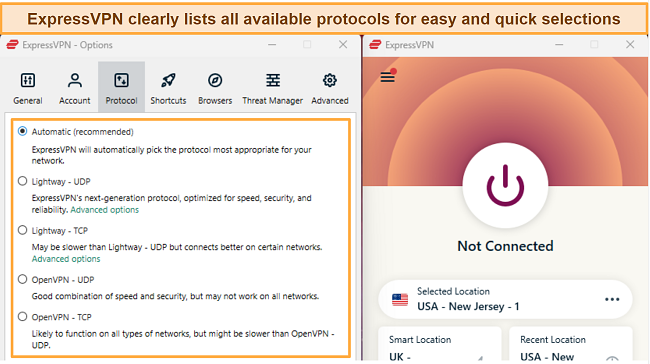
You can use ExpressVPN on up to 8 devices simultaneously. All apps share a consistent and user-friendly interface, so switching between platforms is easy. The Lightway protocol is available on all apps, so you needn’t worry about exceeding your data limit while traveling with multiple devices.
Besides having the largest network on this list, all ExpressVPN’s 3,300+ servers in 105 countries are obfuscated. They disguise your traffic as regular data for easily accessing local sites and services like Netflix US on restricted school or work networks.
One slight issue with ExpressVPN is that it’s slightly pricier than its peers. However, its overall value justifies the price tag. Besides the fact that ExpressVPN’s data usage is nearly half that of other VPNs, it’s also the fastest and the only VPN that consistently works in China.
Subscribing to its 2-year plan will reduce the price by %. You can try ExpressVPN confidently as it’s backed by a 30*-day money-back guarantee. I got my refund in just 3 days after submitting a request via live chat without being persuaded to stay.
Editor’s Note: Transparency is one of our core values at WizCase, so you should know we are in the same ownership group as ExpressVPN. However, this does not affect our review process, as we adhere to a strict testing methodology.
2025 Update! You can subscribe to ExpressVPN for as low as per month with a 2-year purchase (save up to %)!! This is a limited offer so grab it now before it's gone. See more information on this offer here.
2. CyberGhost — Optimized Servers are Efficient for Streaming, Torrenting, and Gaming
Key Features:
- 9,757+ servers in 100 countries, with specialty connections for high-bandwidth tasks
- Includes NoSpy servers, data compression on Android, a no-logs policy, and smart WiFi protection
- Supports 7 simultaneous connections and works on all popular platforms
- Troubleshooting options include live chat, email, and an online knowledge base
- Provides a 45-day money-back guarantee for a risk-free purchase
CyberGhost’s optimized servers efficiently handle data-intensive taskslike streaming, torrenting, and gaming. They prioritize these data packets and reserve ample bandwidth to provide the best latency and speeds with minimal traffic sendbacks.
While my data usage levels remained the same, CyberGhost’s streaming servers were almost 10% faster than regular ones. Similarly, its torrenting server reduced download time by 40 seconds for a copyright-free classic, Night of the Living Dead.
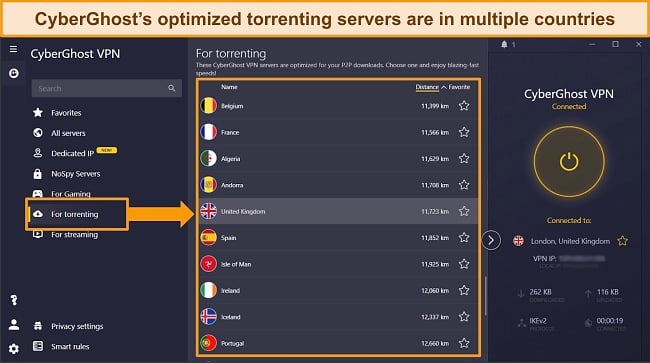
Its smart WiFi protection optimized my data usage — I configured CyberGhost to connect automatically on unsafe public networks and disconnect on my home WiFi. Plus, it includes:
- Data compression — reduces the bandwidth of web pages and content-rich apps to save your data, but it’s only available on Android.
- No-logs policy — ensures that your data isn’t logged on CyberGhost’s servers, and these findings have been audited and verified by Deloitte.
- NoSpy servers — prevent possible third-party data mishandling, as they’re owned and managed by CyberGhost in its private data center in Romania.
Due to its minimalist interface, I easily found optimized servers, protocols, and smart rules on all CyberGhost’s apps. Marking a server as a favorite made it accessible through the Quick Connect menu from my Mac’s menu bar. You can use CyberGhost on your smart TV, Fire TV Stick, or router as it supports up to 7 simultaneous connections.
Unfortunately, CyberGhost’s Mac app doesn’t have gaming servers. However, Macs aren’t built for gaming and most gamers use PCs, laptops, or consoles. If you’re gaming on your mobile network, CyberGhost’s gaming servers optimize data usage by selecting the most efficient path to route your traffic.
I recommend CyberGhost’s 2-year plan due to its % discount. You can try it risk-free with its 45-day money-back guarantee. I submitted my request via live chat and got it approved within 5 minutes. The money was credited into my account after 5 days.
3. Private Internet Access — Flexible Encryption Reduces Data Usage and Boosts Speeds When Required
Key Features:
- Has an extensive network of 35,000+ servers in 91 countries
- Includes secure and resource-friendly protocols, split tunneling, a kill switch, and built-in leak protection
- Works on unlimited devices simultaneously without glitches and crashes
- Offers technical assistance via live chat, email, and an online knowledge base
- Backs up your purchase with a 30-day money-back guarantee
PIA’s flexible encryption reduces data consumption when you’re on a cellular network. You can reduce the cipher from 256-bit to 128-bit. This boosts speeds by reducing the time to encrypt your data at the slight cost of security. However, 128-bit is still very secure for sensitive tasks like online banking. In addition, PIA secures you with:
- MACE ad blocker — blocks pop-up ads, malware, and trackers before they can load onto web pages, but this can increase data usage between 5 to 10%.
- Perfect Forward Secrecy — gives a unique encryption key for each VPN session so that even if a hacker obtains one key, they can’t access data from other sessions.
With 35,000+ servers in 91 countries, PIA has one of the most extensive networks. You’ll find multiple IP addresses anywhere you travel to. If you just want to spoof your location without encryption and save data, PIA’s SOCKS5 and Shadowsocks proxies are a good option.
You can encrypt all your devices with its unlimited simultaneous connections. PIA didn’t glitch or crash when I used it on 10 devices, unlike other VPNs in my tests. Its InBrowser blocked trackers and ads and cleared my history after the session, but it consumed 8% more data than Safari while browsing.
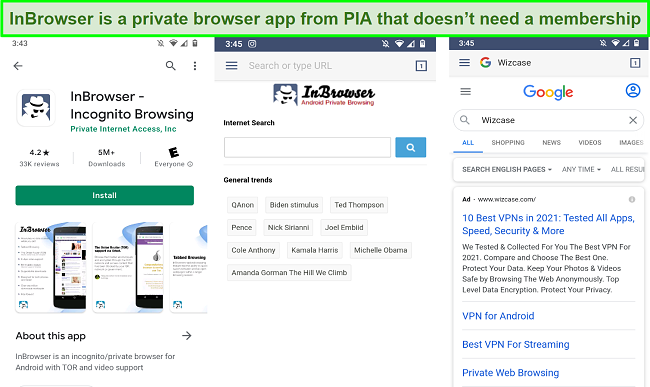
My only reservation with PIA was its location in the US, which is part of the 5 Eyes alliance of intelligence-sharing countries. However, PIA has a no-logs policy audited by Deloitte and uses RAM-only servers that run on volatile RAM and can’t log your data.
Offering a month on its 2-year plan, PIA is one of the most affordable VPNs on the market. You can try it risk-free for 30 days with its refund policy. I provided my invoice details to the live chat support agent. They processed my request in 5 minutes, and I was reimbursed in 5 working days.
How I Chose the Best VPNs for WiFi and Cellular Network
Choosing the right VPNs for WiFi and cellular networks, especially considering data usage, requires a detailed assessment. You need a VPN that’s efficient on data without compromising on other crucial aspects.
- Data compression — I focused my search on VPNs that can compress data to reduce usage or are inherently efficient for browsing, streaming, torrenting, and gaming.
- Protocol efficiency — I looked for VPNs offering protocols like WireGuard, known for efficiency and lower data overhead.
- Server breadth — I prioritized VPNs with a vast network of servers globally. Closer servers mean less data loss and retransmission.
- Split tunneling — I ensured my VPNs have split tunneling so that you can choose which apps should use the VPN and save data.
- Performance on unstable networks — I tested each VPN’s performance on unstable networks and picked ones that don’t overuse your data to maintain a healthy connection.
- Bandwidth limitations — I picked VPNs that offer unlimited bandwidth. Bandwidth restrictions slow down your speeds and use more data due to longer load times.
FAQs on VPNs and Data Usage
Can I use a VPN on cellular data?
Yes, you can use a VPN in these 3 easy steps if you’re connected to the internet. However, a VPN can consume 5 to 20% more data depending on its settings and your online activities. Cellular networks are pretty safe, so you needn’t use a VPN unless you’re banking online or making payments. This will save your valuable data over time.
Do obfuscated servers use more data?
Yes, they add extra layers of data processing to disguise VPN traffic as regular data. This additional processing increases packet size and uses more data. In my tests, obfuscated servers were about 12% more resource-heavy than regular ones. For me, it’s an acceptable trade-off when you want to access social media sites on restricted work networks.
Does using a VPN remove data caps and throttles?
A VPN can’t remove data caps but can sometimes get past throttles. These top-ranked VPNs in 2025 prevent leaks and hide your data packets to get past throttles imposed by restricted networks on specific activities like streaming. I don’t condone misusing VPNs to bypass ISP-imposed throttles or accessing banned sites in your country.
Does a VPN use more battery?
Yes, because a VPN requires additional processing power to encrypt and decrypt your data. However, these top tips reduce a VPN’s data usage and battery drain. Note that the amount of battery usage also depends on how data-intensive your usage is. For instance, UHD streaming with a VPN will drain the battery faster than casual browsing.
Can I connect to a VPN server without an internet connection?
No, a VPN needs an internet connection to encrypt and route your data through its servers. Make sure you pick a VPN that meets the criteria I’ve mentioned to prevent excessive data usage and battery drain while ensuring fast speeds and top-notch security and privacy.
Can I use a free VPN and expect low data usage?
It’s unlikely. Most free VPNs use inefficient protocols that consume more data. Instead, you can use a premium VPN like CyberGhost free for 45 days with its money-back guarantee. You’ll get a full refund if you ask for it before the period expires.
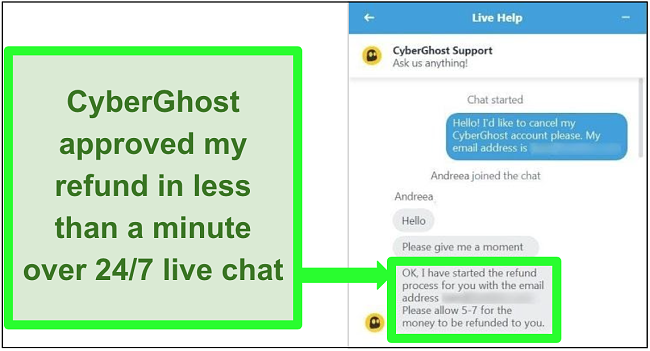
Many free VPNs sell your data to third parties and can even infect your device. While there are a few safe and free VPNs, they’re often constrained by data caps, limited bandwidth, and overcrowded servers.
Use a Reliable VPN on WiFi and Mobile Data
An unsuitable VPN can heavily consume your data without protecting you from cyber threats. If you’re on a budget mobile plan, consider using a VPN only on public networks and while doing sensitive tasks such as online banking. The trick is to get a VPN with an efficient network infrastructure to prevent needless data consumption.
Unfortunately, finding such VPNs can be challenging. To save you time and effort, I tested several options and picked the best ones for minimizing data usage. ExpressVPN is my #1 pick, as it balances efficiency with fast speeds and top-notch security. Best of all, you can try ExpressVPN confidently because it’s backed by a 30*-day money-back guarantee.
*Please note that ExpressVPN’s generous money-back guarantee applies to first-time customers only.
Summary — Here are the Top VPNs for Efficient Data Usage
Editor's Note: We value our relationship with our readers, and we strive to earn your trust through transparency and integrity. We are in the same ownership group as some of the industry-leading products reviewed on this site: ExpressVPN, Cyberghost, Private Internet Access, and Intego. However, this does not affect our review process, as we adhere to a strict testing methodology.

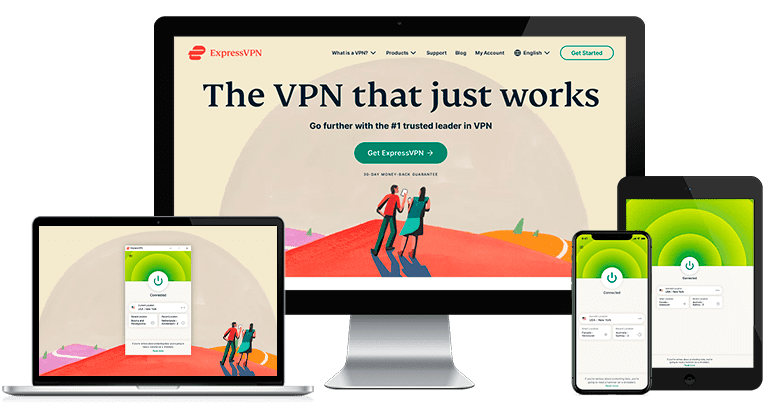
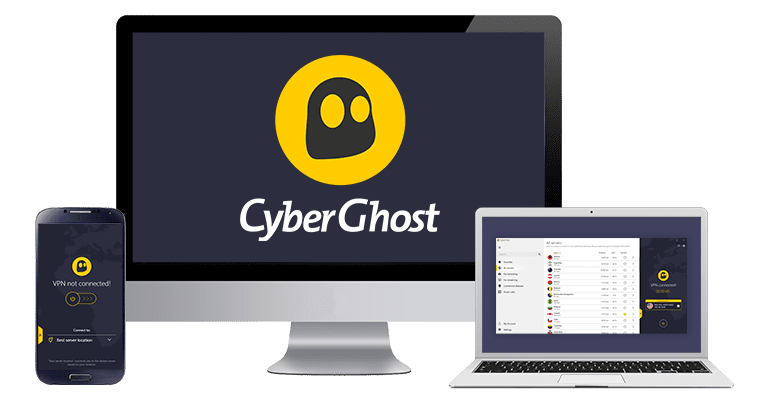
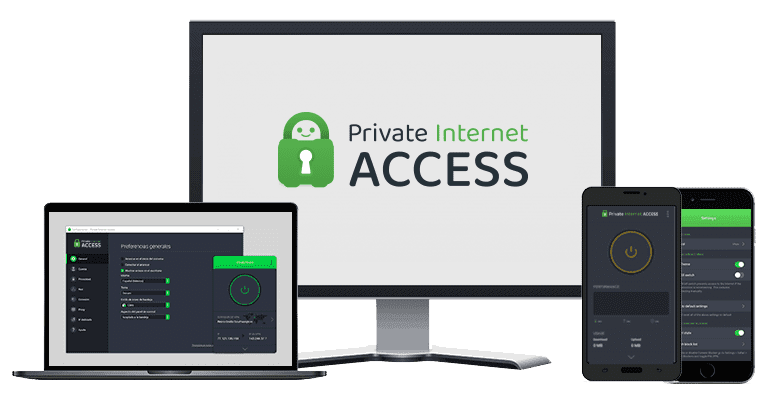



Leave a Comment
Cancel